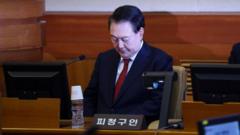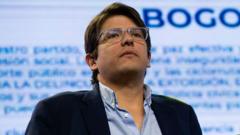In a dramatic courtroom scene, suspended South Korean president Yoon Suk Yeol firmly denied his involvement in ordering the arrest of lawmakers amid martial law controversies.
**Yoon Suk Yeol's Impeachment Trial Escalates Tensions in South Korea**

**Yoon Suk Yeol's Impeachment Trial Escalates Tensions in South Korea**
Suspended president denies allegations and faces fierce opposition during court proceedings.
South Korea's suspended president Yoon Suk Yeol made a highly anticipated appearance at his impeachment trial, amid intense security and rising public unrest. This marks his first appearance since the parliament voted for his impeachment last month, igniting a fierce struggle over his political future. The trial, undertaken by the Constitutional Court, aims to determine whether Yoon should be permanently removed from his post.
Yoon, currently facing a separate criminal investigation concerning accusations of insurrection, denied allegations suggesting he had commanded military officials to arrest lawmakers on the night he declared martial law, a move he claims was a precautionary measure due to purported threats from domestic "anti-state forces" and North Korea. Observers were struck by the juxtaposition of courtroom tension and the escalating fervor of his supporters outside, where clashes with law enforcement had taken a violent turn just days prior.
In his opening statements, Yoon asserted, "I am a person who has lived with a firm belief in liberal democracy," emphasizing the need for thorough scrutiny by the court. His legal counsel argued that his martial law declaration was merely a procedural gesture rather than an actionable mandate. However, prosecutors dismissed these claims as contradictory and vague, stating that evasion of responsibility would further alienate public sentiment.
Outside the courthouse, Yoon's supporters, waving a mix of Korean and U.S. flags, congregated to voice their demands for his return to power. Many regard his actions as a stand against communism, framing the conflict as a battle for democracy versus perceived pro-China and North Korea sympathies. The situation remains fraught with tension, as former Defense Minister Kim Yong-hyun is scheduled to provide testimony in the upcoming hearing.
If the Constitutional Court bench, comprised of eight members, votes to uphold the impeachment, Yoon will face immediate removal from office. This would trigger a presidential election within 60 days, further complicating South Korea's already tumultuous political landscape and threatening economic stability amidst ongoing protests in the cold winter weather.
Yoon, currently facing a separate criminal investigation concerning accusations of insurrection, denied allegations suggesting he had commanded military officials to arrest lawmakers on the night he declared martial law, a move he claims was a precautionary measure due to purported threats from domestic "anti-state forces" and North Korea. Observers were struck by the juxtaposition of courtroom tension and the escalating fervor of his supporters outside, where clashes with law enforcement had taken a violent turn just days prior.
In his opening statements, Yoon asserted, "I am a person who has lived with a firm belief in liberal democracy," emphasizing the need for thorough scrutiny by the court. His legal counsel argued that his martial law declaration was merely a procedural gesture rather than an actionable mandate. However, prosecutors dismissed these claims as contradictory and vague, stating that evasion of responsibility would further alienate public sentiment.
Outside the courthouse, Yoon's supporters, waving a mix of Korean and U.S. flags, congregated to voice their demands for his return to power. Many regard his actions as a stand against communism, framing the conflict as a battle for democracy versus perceived pro-China and North Korea sympathies. The situation remains fraught with tension, as former Defense Minister Kim Yong-hyun is scheduled to provide testimony in the upcoming hearing.
If the Constitutional Court bench, comprised of eight members, votes to uphold the impeachment, Yoon will face immediate removal from office. This would trigger a presidential election within 60 days, further complicating South Korea's already tumultuous political landscape and threatening economic stability amidst ongoing protests in the cold winter weather.





















